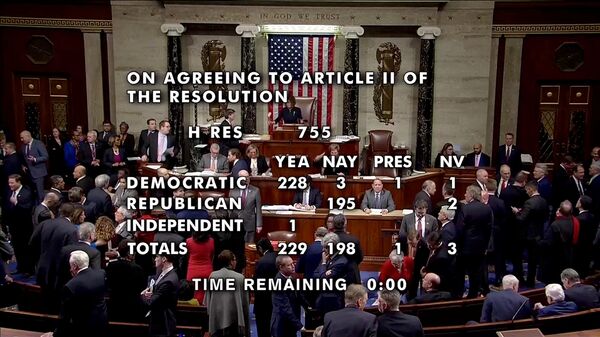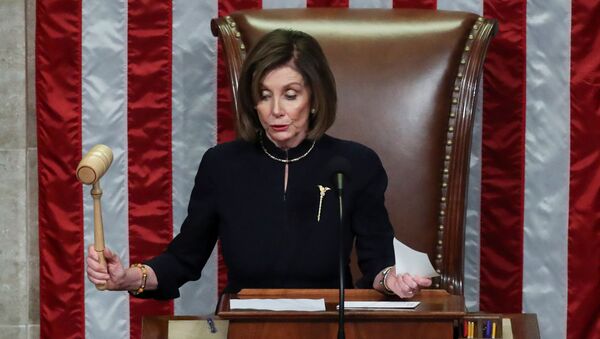Nancy Pelosi's decision to delay the transmission of the articles of impeachment has prompted a storm of criticism from the Republicans. Senate Majority Leader Mitch McConnell presumed that the House Democrats are afraid of sending their "shoddy work product to the Senate". For his part, Senator Lindsey Graham voiced concerns over the House dictating the terms of the trial to the Senate and instead holding the Articles of Impeachment back to be released at a time of their choosing.
My concern is the precedent we are setting.
— Lindsey Graham (@LindseyGrahamSC) December 19, 2019
The Constitution never envisioned the House being able to:
➡️ Impeach the president.
➡️ Dictate the terms of the trial in the Senate.
➡️ And hold the Articles of Impeachment back to be released at a time of their choosing.
(1/2)
Patrick Borchers, Lillis Family Professor of Law at Creighton University, Nebraska, has shed light on the controversy surrounding the Trump impeachment process.
Sputnik: What's your take on Pelosi's refusal to send the articles of impeachment to Senate immediately after the vote? She claimed that the Senate rules are "unfair", adding that "hopefully it will be fairer, and when we see what that is, we'll send our managers". Doesn't this approach contradict the Constitution?
Patrick Borchers: I believe that Pelosi is trying to get some leverage to gain what she perceives as fairer rules for the trial in the Senate. Senators take a special oath before an impeachment trial to judge the case impartially. Several Senators have said in essence that they have already decided to vote not guilty and will not call witnesses or examine any other evidence. I believe Pelosi is angry about this. However, in fact, Pelosi has very little leverage. The Senate has 53 Republicans and almost all of them are virtually certain to vote not guilty.
The Constitution does not require her to forward the Articles of Impeachment at any time. I think the Framers of the Constitution probably assumed that the Articles would be delivered to the Senate almost immediately but the Constitution does not require it. Because impeachments of Presidents are so rare there’s little historical precedent. In any event, the Senate will not reconvene until 6 January 2020 and I will be surprised if the Articles have not been delivered by then.
Sputnik: On Tuesday, a member of the House Judiciary Committee, Rep. Ken Buck, R-Colo., suggested in his interview with Fox News that House Democrats "have set the bar so low" on what constitutes impeachable offenses that the Republicans has now precedent to do the same to a future Democratic president. What's your take on this stance, does it have any grounds? Could the Republicans weaponise the precedent and what consequences would it have for the American democracy?
Patrick Borchers: I think these concerns are overblown. President Trump is a unique personality. 40% will vote for him no matter what. 40% will not vote for him no matter what. I have never seen an American President produce such strong emotions in both directions, and it’s unlikely to happen again. In the US, serious crimes are prosecuted as follows. A Grand Jury hears evidence from the prosecutor and meets in secret. If the Grand Jury decides there’s enough evidence of a possible crime, then the case goes to trial before what is known as a Petit Jury with a judge presiding, in which the evidence from both sides is put on and the defendant has a lawyer and proof of guilt must be found beyond a reasonable doubt.
The House of Representatives acts essentially as a Grand Jury. If one assumes the worst possible facts for Trump, he directly or through intermediaries said to [Ukrainian President Volodymyr] Zelensky that Ukraine would not get the appropriated aid unless Zelensky announced an investigation into [Joe] Biden, and then obstructed Congress’s attempt to find out about it. If true, these would be serious crimes; probably more serious than Bill Clinton’s.
However, I must emphasise that this assumes the worst set of facts for Trump. The House’s job is not to determine guilt or innocence but whether there is enough evidence to merit a trial in the Senate, which requires 2/3 (67) Senators to vote guilty to remove the President. (Impeachment is also used occasionally for other high ranking members of government. In the history of the United States, 15 federal judges have been impeached and 8 were convicted in the Senate — though 3 resigned before the trial began in the Senate.)
Because the House impeachment proceedings centered on evidence of Trump’s guilt, there’s no way to know (at this point) for certain what a full trial could produce. No President has ever been convicted by the Senate, though Andrew Johnson in 1868 came within one vote of conviction. The vote on Clinton in the Senate was about 50-50. Richard Nixon in 1974 hoped to avoid removal, but was informed by leaders of his party in the Senate that he likely would be convicted and he resigned before impeachment.
It’s possible that attempted impeachments will become more common now, but the practical difficulties of actually gaining a 2/3 majority in the Senate will probably make it an unwise political calculation.
Sputnik: Why do the Republicans insist that the Democrats have pursued Trump on insufficiently substantiated charges? Are there any serious flaws in the House Democrats' impeachment process?
Patrick Borchers: The Republicans have not been entirely consistent in their criticism of the House proceedings. Some seem to take the position that the rough transcript of the call with Zelensky shows that Trump was not pressuring him. Others seem to take the position that even if he was pressuring Zelensky this is not an impeachable offense. Others complain that the process has been one-sided concentrating only on the possibility of Trump’s guilt. That said, there have been some unusual aspects to this impeachment. The witnesses testified in front of the House Intelligence Committee, whereas normally it would be in front of the House Judiciary Committee. The vote was almost exactly along partisan lines, which is unusual for impeachment proceedings. Trump’s brash personality produces passionate support and passionate opposition.

Sputnik: Given that the Senate is unlikely to convict the president what is this impeachment all about? Does it change anything? According to the latest USA TODAY/Suffolk University Poll, Trump is leading his top Democratic rivals in his bid for a second term despite the impeachment procedure.
Patrick Borchers: The polls are mixed and of relatively little predictive value at this point. Currently, the Real Clear Politics average of major polls show that 44% of voters approve of Trump’s performance and 52% disapprove, with very little movement as the impeachment has dragged on. The most recent "match-up" polls are a mixed bag. The one you cited showing Trump winning, but one that came out the next day showed Trump losing or tied with all of his likely opponents. The Fox News poll of two days ago showed Trump losing by substantial margins.
Two factors will probably determine the election, and I believe that the impeachment proceedings will not be a large factor. Currently, the US economy is doing fairly well. Annual growth is close to 3% and unemployment is very low (around 3%). If that continues it will help Trump, because some voters who do not like him will vote for him anyway.
There are economic headwinds, however. The trade dispute with China has hurt heavily agricultural states that supported Trump in 2016. A “hard” Brexit could roil global trade enough to affect the US. Trump has no control over the Federal Reserve Bank, which sets interest rates in the US. If it does not cut rates growth will slow. If the US begins to slide into a recession in 2020 (and economists disagree as to whether this is likely) that will hurt Trump.
The other is whom the Democrats nominate. I believe that Trump will probably beat one of the “hard left” candidates like [Bernie] Sanders or [Elizabeth] Warren. Their agendas will require very steep tax increases. However, if the Democrats nominate a more moderate candidate like Biden, Klobuchar (a woman Senator from Minnesota who is beginning to get traction), or Bloomberg, Trump stands a much better chance of getting beat.
Had the House Democrats asked my advice (they didn’t obviously), I would have recommended calling the same witnesses and then voting to “censure” the President. This would have not had anything more than symbolic importance, but the same is true of impeachment. Trump will not be convicted by the Senate. This will allow him to claim victory in the end. A censure resolution would not have required interaction with the Senate in any way.




